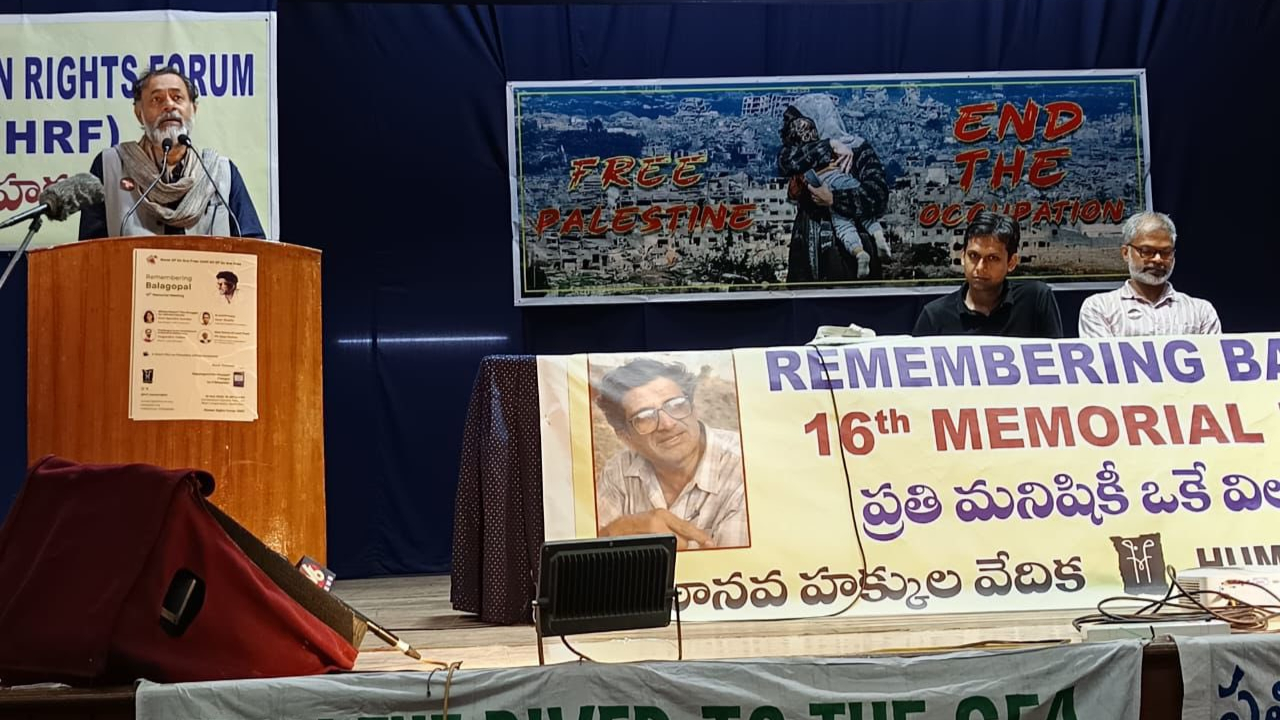K Balagopal transitioned to full-time activism after witnessing police atrocities in the 1980s Naxalite conflicts in Andhra Pradesh.
Published Oct 15, 2025 | 2:12 PM ⚊ Updated Oct 15, 2025 | 2:12 PM

Yogendra Yadav accused BJP of undermining India's electoral framework through initiatives like 'One Nation, One Election', delimitation, and SIR of electoral rolls. Credit: x.com/_YogendraYadav
Synopsis: The 16th memorial for K Balagopal, held on 12 October in Hyderabad, highlighted his human rights legacy. Organised by HRF, the event addressed electoral democracy threats and Adivasi rights. Speakers like Yogendra Yadav criticized BJP’s electoral reforms, while Nandini Sundar and PS Ajay Kumar discussed Adivasi suppression and land theft. A book and documentary screening honored Balagopal’s fight against state repression.
The 16th memorial meeting was held on 12 October in remembrance of renowned human rights activist, lawyer, and mathematician K Balagopal. The event took place at Sundarayya Vignana Kendram in Hyderabad.
Organised by the Human Rights Forum (HRF), which Balagopal helped found in 1998, the event drew attention to pressing issues like assaults on electoral democracy and Adivasi rights.
The day-long gathering, themed “Challenges to the Architecture of Electoral Democracy” and “The Struggle for Adivasi Futures,” featured prominent speakers including political analyst Yogendra Yadav, sociologist Dr Nandini Sundar, and tribal activist PS Ajay Kumar. Attendees paid tribute to Balagopal, who passed away on 8 October, 2009.
Yogendra Yadav, in his address, accused the BJP of undermining India’s electoral framework through initiatives like ‘One Nation, One Election’ (ONOE), delimitation based on the 2026 census, and Special Intensive Revision (SIR) of electoral rolls.
He described these as attempts to shift India toward an “electoral autocracy,” warning that SIR could disenfranchise 10-20 percent of voters, particularly women, migrants, and the poor.
Yesterday in Hyderabad, at a meeting organised by the Human Rights Forum (HRF) to mark the 16th death anniversary of human rights activist K. Balagopal,
the theme was “Challenges to the Architecture of Electoral Democracy.”To remember Balagopal is to recall the spirit of… pic.twitter.com/TAaruumAls
— Yogendra Yadav (@_YogendraYadav) October 13, 2025
“BJP knew that they could not change the Constitution from the front door, so they have decided to change the architecture of institutions,” Yadav said. He urged the audience to resist these changes as a true homage to Balagopal’s principled stance against state authoritarianism.
Dr Nandini Sundar focused on Bastar, Chhattisgarh, where state actions suppress Adivasi voices to favour mining interests. She slammed the persistence of vigilante groups like Salwa Judum, despite a 2011 Supreme Court ban, and highlighted judicial inconsistencies in protecting Adivasi rights.
“The peace-talks can’t come on the back of mining and outsiders, but through justice, and a wider thinking of the structure of Adivasi rights,” Sundar stressed.
PS Ajay Kumar discussed emerging forms of land theft, including digitisation of records that threaten marginalised communities, and warned against the central government’s push for the Land Titling Act.
The event also included the release of a book compiling Balagopal’s writings on the Constitution, titled “Rajyanganni Ela Chudali” (How to Understand the Constitution), and a screening of a documentary on the Israeli actions in Palestine, reflecting Balagopal’s global conscience on issues like communal violence and state repression.
Born in 1953, K Balagopal began his career as a mathematician and lecturer at Osmania University but transitioned to full-time activism after witnessing police atrocities in the 1980s Naxalite conflicts in erstwhile Andhra Pradesh.
He founded the Andhra Pradesh Civil Liberties Committee (APCLC) and later HRF, documenting fake encounters, custodial deaths, and caste violence. His essays critiqued fascist tendencies in Indian democracy, anti-terror laws like TADA, and the judiciary’s complicity in upholding state power.
Balagopal opposed violence from both the state and Maoists, advocating non-violent civil liberties and supporting causes like tribal land rights under the Forest Rights Act, where he secured landmark High Court judgments restoring thousands of acres to tribals.
His influence endures among the youth, with students at universities like Hyderabad Central University, Osmania, and NALSAR discussing his works on Marxism, Dalit issues, reservations, and international conflicts like Palestine and Kashmir.
(Curated by Amit Vasudev)
